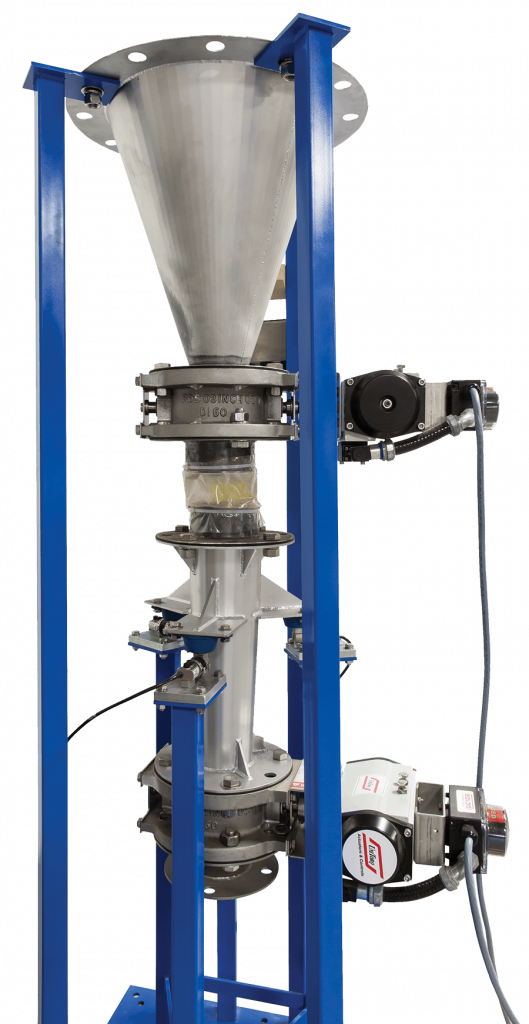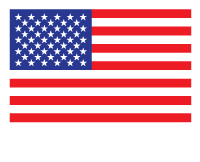
Your valve seats should be able to withstand your industrial processes without needing a lot of maintenance. If your processes include extreme temperatures, pressures, and exposure to certain environments, they must ensure optimal performance and longevity. Failure could lead to disaster if it happens at the wrong time.
Related Post: Understand the 3 Main Reasons Why Valve Seats Fail in Solids Handling Applications
Roto-Disc offers advanced solutions addressing the challenges associated with the environments in which your valve seats must operate. Our innovative approach and custom designs involve using materials capable of withstanding your industrial processes, offering durability and reliability even in less-than-ideal conditions.
We’ll discuss the metal alloys we use in constructing our valve seats and what processes and environments they excel in.
Stainless Steel
Stainless steel is the standard for many valve seats, and for good reasons.
Stainless Steel 304
Stainless Steel 304 is a widely used alloy in Roto-Disc valve seats, renowned for its excellent corrosion resistance and versatility. With a chromium content of around 18%, it forms a passive oxide layer that protects corrosive environments, making it ideal for applications where exposure to moisture or chemical substances is prevalent.
This alloy excels in moderate temperatures and is often selected for general-purpose valve seat applications. Its affordability, ease of fabrication, and oxidation resistance make it a popular choice across various industries.
For example, Stainless Steel 304 would be ideal for dry powders and plastic pellets when you need to distribute precise amounts from hoppers into mixers.
However, for more demanding applications with higher corrosion resistance, the team at Roto-Disc may recommend alternative alloys such as Stainless Steel 316 or Duplex.
Stainless Steel 316
Stainless Steel 316, an austenitic chromium-nickel alloy, is a step above 304 in corrosion resistance, particularly in aggressive and chloride-rich environments.
Its increased molybdenum content (around 2-3%) enhances its resistance to pitting and crevice corrosion, making it an excellent choice for applications involving harsh chemicals or saline conditions.
Stainless Steel 316 is utilized in valve seats for chemical processing, marine, and pharmaceutical industries.
This alloy is well-suited for temperatures up to approximately 1,562 degrees Fahrenheit (850 degrees Celsius). Its durability and corrosion resistance make it a reliable option for challenging environments, and the distinction between 304 and 316 lies in the specific demands of the application, with 316 being the preferred choice for more corrosive settings.
Duplex Stainless Steel
Duplex stainless steel, a dual-phase alloy combining characteristics of austenitic and ferritic stainless steels, is a high-performance option for valve seats requiring exceptional strength and corrosion resistance.
Duplex exhibits superior durability with a balanced chromium, nickel, molybdenum, and nitrogen composition, particularly in aggressive chemical environments and high-temperature applications.
This alloy is well-suited for temperatures exceeding 850 degrees Celsius (1,562 degrees Fahrenheit), making it an excellent choice for extreme conditions.
Duplex stainless steel excels in environments where pitting, crevice corrosion, and stress corrosion cracking are typical. Its strength and resistance to corrosion make it a preferred material for Roto-Disc valve seats in demanding industries such as oil and gas, petrochemicals, and offshore applications, where reliability and longevity are of utmost importance in remote locations or when equipment is hard to get to.
AR400 Abrasion-Resistant Steel
AR400 abrasion-resistant steel is high-strength steel designed to resist wear and abrasion. The “AR” in AR400 stands for “Abrasion Resistant,” and the 400 indicates the Brinell hardness number, which measures the hardness of the material. AR400 steel is engineered to provide excellent abrasion resistance in harsh conditions where wear and impact are common, making it suitable for applications in industries such as mining, construction, and material handling.
Key features of AR400 Abrasion-Resistant Steel
Hardness: AR400 steel is hardened to a Brinell hardness of 360-440 HBW (Brinell Hardness Number). This high level of hardness contributes to its resistance against wear and abrasion. Tempered steel wear plates can go up to 700 HBW for metallic materials.
Toughness: AR400 steel maintains toughness, allowing it to withstand impacts and deformation without fracturing.
Weldability: AR400 can be welded, although proper welding procedures and precautions are necessary to maintain its abrasion-resistant properties.
Formability: While AR400 is harder than regular structural steel, it still offers reasonable formability for fabrication processes such as bending, cutting, and welding.
Applications
Common applications for AR400 abrasion-resistant steel include components and structures exposed to abrasive wear, such as buckets, blades, liners, crushers, and other equipment in mining, construction, and material handling industries.
AR400 is just one grade within the family of abrasion-resistant steels. There are other grades like AR450, AR500, and beyond, each varying to suit different applications. The choice of a specific grade depends on the severity of the abrasive conditions the material will face.
Hastelloy-C
Hastelloy C is a specific type of alloy, a family of high-performance nickel-based alloys known for excellent corrosion resistance, high strength, and versatility. Hastelloy C primarily contains nickel, chromium, and molybdenum, with small amounts of other elements.
Key Characteristics of Hastelloy C
Corrosion resistance: Hastelloy C is highly resistant to corrosion, especially in aggressive chemical environments. It can withstand attack from various corrosive media, including acids, chlorides, and reducing agents.
High-temperature resistance: This alloy maintains its mechanical properties at elevated temperatures, making it suitable for applications in high-temperature environments.
Versatility: Hastelloy C alloys are used in various industries, including chemical processing, petrochemicals, pollution control, and nuclear power.
Molybdenum content: The presence of molybdenum enhances the alloy’s resistance to pitting and crevice corrosion, particularly in chloride-rich environments.
Nickel-chromium matrix: The nickel-chromium matrix of Hastelloy C provides a combination of high-temperature strength and corrosion resistance.
Applications of Hastelloy C
These alloys are used in critical applications where corrosion resistance is paramount, such as in chemical processing equipment, reactor vessels, and components exposed to aggressive chemical environments.
These applications include chemical processing, pollution control, power generation, oil and gas processing, and waste treatments.
Inconel
Inconel is a family of high-performance nickel-chromium-based superalloys known for their excellent corrosion resistance, high strength at elevated temperatures, and good mechanical properties in challenging environments.
Key Characteristics of Inconel
Corrosion resistance: Inconel alloys exhibit exceptional corrosion resistance in various environments, including extreme temperatures and corrosive atmospheres.
High-temperature strength: Inconel retains its strength and integrity at elevated temperatures, making it suitable for applications in high-temperature environments, such as jet engines and gas turbine components.
Oxidation resistance: These alloys resist oxidation and scaling even at high temperatures, contributing to their longevity in demanding conditions.
Creep resistance: Inconel maintains its strength under prolonged exposure to high temperatures, making it suitable for applications requiring resistance to creep deformation.
Fabricability: Inconel alloys can be easily formed and welded, contributing to their versatility in manufacturing processes.
Applications of Inconel
Inconel alloys find unique applications in industries that demand exceptional corrosion resistance, high-temperature strength, and reliability in challenging environments.
Specific applications include chemical processing, nuclear power plants, oil and gas, offshore petroleum sites, heat exchangers, gas turbines, and power generation.
The specific grade of Inconel chosen depends on the application’s requirements, as different qualities within the Inconel family offer varying properties to meet specific needs.
Monel
Monel is a group of nickel-copper alloys known for their excellent corrosion resistance, particularly in highly corrosive environments. These alloys also exhibit good mechanical properties, making them suitable for applications in extreme conditions. Monel alloys are composed mainly of nickel and copper, with small amounts of other elements such as iron and manganese and small additions like silicon and carbon.
Key Characteristics of Monel
Corrosion resistance: Monel alloys are highly corrosion-resistant, particularly in acidic and alkaline environments. They are known for their resistance to stress corrosion cracking and pitting.
High strength: Monel alloys retain their strength at high temperatures, making them suitable for applications in challenging conditions.
Excellent ductility: Monel exhibits good flexibility, allowing it to be formed and shaped easily.
Low magnetic permeability: Monel is typically non-magnetic in the annealed condition, although it can become slightly magnetic after cold working.
Weldability: Monel can be welded using various methods, although care must be taken to avoid heat-affected zone issues.
Applications of Monel
Monel alloys offer a combination of corrosion resistance, strength, and versatility, making them valuable in a wide range of industries where materials must withstand harsh conditions.
Monel is used in extreme environments like marine applications, including shipbuilding and offshore structures, and the aerospace industry due to its resistance to seawater corrosion.
You can also commonly find Monel used in chemical processing, oil and gas, medical equipment, electrical components, food processing, and heat exchangers.
Custom Alloy Requests
We offer a comprehensive approach to meeting your needs. Specific applications demand specialized materials beyond the standard offerings. Roto-Disc provides other alloys upon request to cater to these unique requirements.
Related Post: 10 Industries Our Custom-Built Industrial Valves Help With Improved Equipment
The process involves a collaborative effort between Roto-Disc’s team and yours to understand the specific environmental conditions, temperature ranges, and corrosive factors the valve will encounter. With this information, we’ll recommend or develop custom alloys.
Benefits of Custom Valves
Our custom valves offer tailored solutions matching the demands of any industry or operational setting. Customizations allow for the selection of materials that enhance corrosion resistance, improve strength, and better performance in specific chemical or temperature environments.
This level of customization ensures that the valves not only meet but often exceed the requirements for the application, contributing to increased efficiency, reduced downtime, and overall cost-effectiveness.
Find the Right Valve With Roto-Disc
If you’re weighing the right material for your valve, contact the team at Roto-Disc. We can help you decide the best option and improve your processes.


